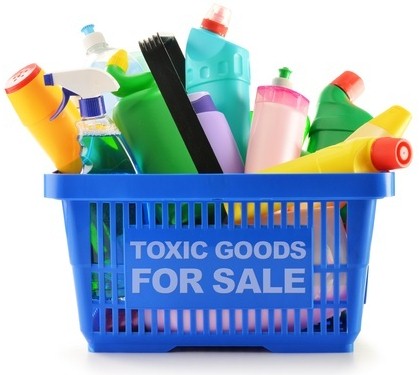Beware of the Hormone Disruptors In Your Cart

You may be unconsciously purchasing products that can cause you and your hormones harm. Hormone disruptors are chemicals normally found in many everyday products such as plastic bottles, metal cans, detergents, toys, cosmetic products, and the like.
What are hormone disruptors?
Hormone or endocrine disruptors are either natural or man-made chemicals that may interfere with the body's endocrine system - the body system that helps control bodily activity through hormone secretions.
The presence of endocrine disrupting chemicals, or EDCs, affects not only humans but also the environment and wildlife. It has harmful effects on the reproduction, growth and development of certain species in the wildlife population.
In humans, EDCs increase risks of reproductive disorders, cancers, and other serious health conditions.
How do hormone disruptors act in your body?
Studies have discovered that hormone or endocrine disruptors adversely influence the endocrine system and its hormonal functions. These hormone disruptors can:
- Mimic or act like the naturally occurring hormones in the body.
- Interfere with how the natural hormones act.
- Speed up or reduce the metabolism of hormones.
- Take the place of the normal hormones in the cells.
- Result in overproduction of hormones or hormone imbalance.
10 Hormone Disruptors to Avoid
You often unknowingly purchase products that contain hormone disruptors or EDCs. Here are 10 of the most dangerous hormone disruptors you should avoid and be aware of when you shop:
1. Bisphenol A or BPAs
Bisphenol A, or BPAs are found in polycarbonate plastics and epoxy resins used in some plastic products. BPAs
imitate the sex hormone estrogen and trick the body into believing it is the real thing, which results in cancers, reproductive problems, obesity, heart disease, and premature puberty.
Go for fresh produce instead of canned food. Avoid plastic products
that have
"PC" marks and recycling label #7 to keep synthetic hormones from entering your body.
2. Dioxins
Dioxins are formed during industrial processes. They are byproducts of the chlorine bleaching processes and are known as human carcinogens. These dioxins adversely affect the immune and reproductive system of humans.
Cut down on animal products that are most likely contaminated. Choose safer alternatives for feminine hygiene products such as sanitary pads and liners, diapers, and tampons.
3. Atrazine
Atrazine is a widely-used herbicide used on corn crops in the United States that indirectly contaminates drinking water. This chemical is linked to serious health problems such as breast tumors, delayed puberty, prostate cancer in men, and prostate inflammation in animals.
Replace food products with organic products that do not use herbicides. It is also advisable to use water filters that block atrazine.
4. Phthalates
Phthalates or plasticizers, are chemicals used to make plastic products hard but flexible. These chemicals are used in almost every product such as vinyl, adhesives, detergents, plastic packaging, hygiene products, and some toys.
Always read the labels on every product you buy to make sure it is safe from phthalates.
Avoid plastic products marked with recycling number #3.
5. Lead
Lead is a toxic heavy metal that adversely affects almost every organ in the body which often leads to serious complications such as brain damage, hearing loss, pregnancy problems, high blood pressure, and kidney damage. It has that power to disrupt your hormone signaling which regulates stress leading you to depression and anxiety.
Purchase a good water filter to make sure that the water you drink will be free from lead. Go healthy with your food choices because healthy diets help your body absorb less lead.
6. Arsenic
Arsenic is a natural element found almost everywhere. It is a steel-gray metal when in pure form but is added to make chemical compounds that are either organic or inorganic. Inorganic arsenic is linked to cancer and other serious illnesses. It also interferes with your body's normal hormone functioning, specifically the glucocorticoid system.
Low levels of arsenic are usually found in food such as drinking water, seafood, rice, mushroom, and poultry products. Exposure to very high levels of arsenic leads is dangerous. Moderation of the above food products and the use of water filters can help reduce your intake of arsenic.
7. Perfluorinated chemicals
Perfluorinated chemicals or PFCs are commonly used in the non-stick cookware you always loved to cook your food in. These chemicals are completely resistant to biodegradation meaning it stays in people's bodies for a very long time. Exposure to these chemicals can lead to decreased sperm quality, kidney problems, thyroid diseases, high cholesterol, and other health problems. In animals, it affects the thyroid and the level of sex hormones.
Although non-stick pans and water-resistant products are more convenient to use, you should refrain from using them to get away from the harmful effects of PFCs in your body.
8. Organophosphate pesticides
Organophosphate pesticides are neurotoxic compounds used in pesticides that target the nervous system of insects. Exposure to organophosphate pesticides is linked to brain problems and infertility. It can also be blamed for your declining testosterone levels as it interferes with the communication between the cells and the hormone
testosterone. It also alters your thyroid hormone levels.
To be safer, choose organic fruits and vegetables because they have lesser exposure to pesticides.
9. Glycol ethers
Glycol ethers are chemicals commonly used as solvents in paints, cosmetics, cleaning products, and brake fluid. This chemical should be kept out of your cart and your home due to its serious effects to health. It can shrink testicles, damage an unborn child, lower sperm production, and may cause asthma and allergies.
10. EGBE
Check your product labels for 2-butoxyethanol (EGBE) and methoxydiglycol (DEGME) and immediately dispose of them.
The hormone or endocrine disruptors found in many household products are seriously dangerous but are never totally banned. Make sure to educate yourself about these chemicals so you could avoid and dispose of them immediately.
Disruption of hormones is no joke. Be smart and shop smart. Stay away from the hormone disruptors you might be placing in your cart!
This article is by Genemedics Health Institute, an expert in natural bioidentical hormone replacement therapy.
More Tips
